Comprehensive Guide to Garden Maintenance in Paddington
Introduction to Garden Maintenance
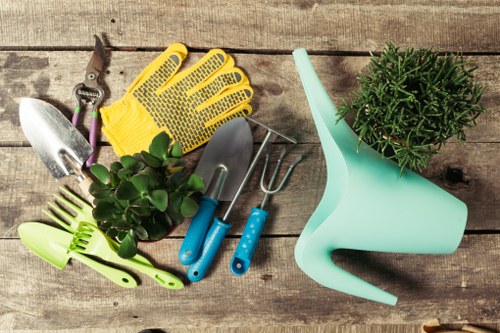
Maintaining a beautiful garden in Paddington requires dedication, knowledge, and the right resources. Whether you are a seasoned gardener or a novice, understanding the fundamentals of garden maintenance ensures your outdoor space remains vibrant and healthy throughout the year.
In Paddington, the climate and soil conditions present unique challenges and opportunities for garden enthusiasts. By implementing effective maintenance strategies, you can create a lush, thriving garden that enhances the aesthetic appeal of your home.
This article will explore essential garden maintenance practices tailored to Paddington's environment, providing you with the tools and insights needed to achieve a stunning garden.
Understanding Paddington’s Climate
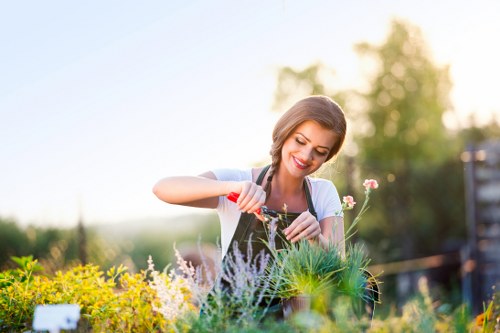
Pebble Bean Garden Maintenance in Paddington thrives under its temperate climate, which features mild winters and warm summers. Understanding the local weather patterns is crucial for effective garden planning and maintenance.
The average temperatures in Paddington allow for a diverse range of plant species to flourish. However, it's important to select plants that are well-suited to the region's specific conditions to minimize maintenance efforts and maximize growth.
Additionally, rainfall in Paddington is fairly consistent throughout the year, providing a reliable water source for your garden. Nevertheless, incorporating efficient irrigation systems can help manage water usage and ensure your plants receive adequate hydration.
Soil Preparation and Health
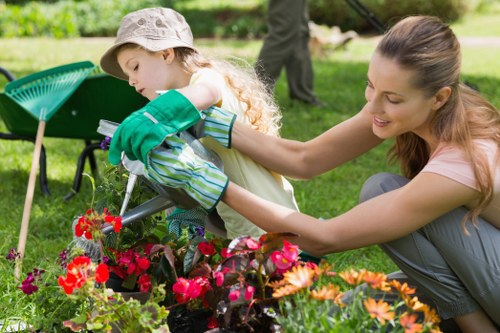
The foundation of any successful garden lies in the quality of its soil. Paddington's soil composition varies, but generally, it is a mix of clay and loam, providing a balanced environment for most plants.
Before planting, it's essential to test your soil's pH levels and nutrient content. This information guides you in amending the soil appropriately, ensuring optimal conditions for plant growth.
Regular soil aeration and the addition of organic matter, such as compost or manure, can significantly enhance soil fertility and structure, promoting healthier and more resilient plants.
Plant Selection and Care
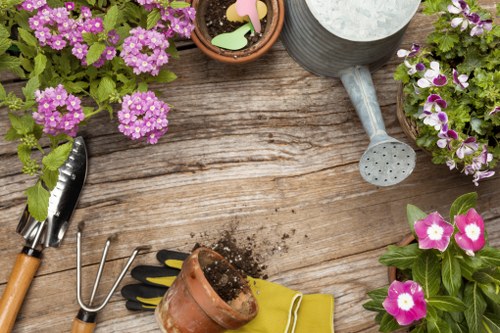
Choosing the right plants is paramount for successful garden maintenance in Paddington. Opt for native species and those adapted to the local climate to reduce maintenance requirements and increase resilience against pests and diseases.
Consider a mix of perennials and annuals to ensure year-round color and interest. Perennials provide lasting structure, while annuals offer seasonal bursts of vibrancy.
Regular pruning, deadheading, and staking are essential practices to maintain plant health and encourage robust growth. Additionally, monitoring for pests and diseases allows for timely interventions, preventing minor issues from escalating.
Irrigation and Water Management
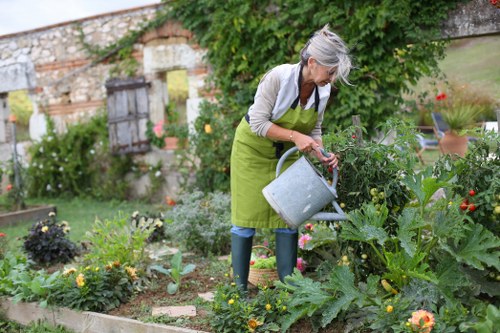
Effective irrigation is a cornerstone of garden maintenance in Paddington. Implementing a well-designed watering system ensures that your plants receive consistent moisture without wastage.
Drip irrigation systems are highly recommended as they deliver water directly to the plant roots, minimizing evaporation and runoff. Additionally, using timers can help automate the watering schedule, promoting efficiency and convenience.
Mulching around plants helps retain soil moisture, reduce weed growth, and regulate soil temperature. Organic mulch materials, such as bark or straw, also contribute to soil health as they decompose.
Fertilization and Nutrient Management
Providing essential nutrients is vital for the growth and vitality of your garden. Regular fertilization supports plant development, flowering, and overall health.
Organic fertilizers, such as compost or fish emulsion, are excellent choices for sustainable garden maintenance. They improve soil structure and encourage beneficial microbial activity.
It's important to follow recommended application rates and schedules to avoid over-fertilization, which can harm plants and the surrounding ecosystem.
Pro Tip: Conducting a soil test periodically helps determine the specific nutrient needs of your garden, allowing for tailored fertilization strategies.
Pest and Disease Control
Maintaining a healthy garden involves proactive pest and disease management. Identifying potential threats early allows for effective control measures, safeguarding your plants.
Implement integrated pest management (IPM) practices, which combine biological, cultural, and mechanical control methods. This approach minimizes reliance on chemical pesticides, promoting a healthier garden environment.
Encouraging beneficial insects, such as ladybugs and lacewings, can naturally reduce pest populations. Additionally, maintaining plant diversity helps prevent the spread of diseases.
Remember: Regular monitoring and prompt action are key to managing pests and diseases effectively.
Lawn Care and Maintenance
A well-maintained lawn enhances the overall appearance of your garden. Proper lawn care involves mowing, watering, fertilizing, and aerating to keep the grass healthy and lush.
Mowing at the correct height encourages deep root growth and prevents weed establishment. It's advisable to vary the mowing pattern to avoid compacting the soil and to promote even growth.
Periodic aeration alleviates soil compaction, allowing air, water, and nutrients to reach the grass roots more effectively.
- Mowing: Maintain blades at 2.5 to 3.5 inches.
- Watering: Provide 1 inch of water per week.
- Fertilizing: Apply in spring and autumn.
Seasonal Garden Maintenance
Each season presents unique maintenance tasks essential for garden health. Adapting your care routine to seasonal changes ensures your garden remains vibrant all year round.
Spring: Focus on planting new blooms, pruning overgrown shrubs, and preparing the soil with compost.
Summer: Maintain consistent watering, manage pests, and deadhead flowers to encourage continuous blooming.
Autumn: Clear fallen leaves, mulch beds, and plant winter-hardy species to prepare for colder months.
Winter: Protect sensitive plants, plan for next year's garden, and perform necessary repairs on garden structures.
Tools and Equipment for Garden Maintenance
Having the right tools simplifies garden maintenance tasks and improves efficiency. Investing in quality gardening equipment ensures longevity and effectiveness.
Essential tools include:
- Pruning shears for trimming plants.
- Garden gloves to protect your hands.
- Hose with adjustable nozzle for precise watering.
- Spade and shovel for digging and soil preparation.
- Lawn mower for maintaining grassy areas.
Regular maintenance of your tools, such as cleaning and sharpening blades, extends their lifespan and ensures optimal performance.
Hiring Professional Garden Maintenance Services
For those seeking expert assistance, professional garden maintenance services in Paddington offer comprehensive care tailored to your garden's needs.
Professional gardeners bring specialized knowledge, experience, and equipment, ensuring high-quality maintenance and addressing complex gardening challenges.
Outsourcing garden maintenance allows you to enjoy a beautiful garden without the time and effort required for regular upkeep. Services typically include:
- Scheduled lawn care and mowing.
- Pruning and trimming of trees and shrubs.
- Weed control and pest management.
- Soil testing and fertilization.
- Seasonal planting and garden design.
Contact us today to learn more about our professional garden maintenance services and how we can transform your Paddington garden.
Sustainable Garden Practices
Embracing sustainable practices in garden maintenance promotes environmental health and reduces your ecological footprint.
Implementing rainwater harvesting systems collects and reuses rainwater for irrigation, conserving water resources. Additionally, using organic fertilizers and pest control methods minimizes chemical usage, protecting beneficial insects and soil integrity.
Composting kitchen and garden waste creates nutrient-rich soil amendments, enhancing garden fertility naturally.
- Rainwater Harvesting: Install barrels to collect and store rainwater.
- Organic Fertilizers: Use compost or manure instead of synthetic options.
- Integrated Pest Management: Combine biological and cultural controls.
Adopting these practices not only benefits your garden but also contributes to a healthier environment.
Landscape Design Ideas for Paddington Gardens
Enhancing your garden with thoughtful landscape design can create a visually appealing and functional outdoor space.
Consider incorporating elements such as pathways, seating areas, water features, and lighting to add interest and utility to your garden.
Choosing a harmonious color palette and plant arrangement enhances the aesthetic appeal and creates a cohesive look.
Tip: Integrate native plants and materials to ensure sustainability and ease of maintenance.
Maintaining Garden Equipment
Proper maintenance of garden equipment ensures safety, efficiency, and longevity of your tools.
Regularly clean and inspect tools for damage or wear. Sharpen blades as needed and replace any worn-out parts to maintain optimal performance.
Store equipment in a dry, sheltered area to prevent rust and deterioration. Using protective covers or racks can organize your tools and extend their lifespan.
Pro Tip: Schedule periodic maintenance checks to address any issues before they escalate.
Budgeting for Garden Maintenance
Effective garden maintenance doesn't have to break the bank. With careful planning and resource management, you can maintain a beautiful garden within your budget.
Create a maintenance schedule prioritizing essential tasks and allocating funds accordingly. Investing in quality tools and materials may have a higher upfront cost but can save money in the long run through durability and efficiency.
Consider DIY practices for tasks like planting and weeding to reduce labor costs, while outsourcing specialized services as needed.
- Prioritize: Focus on high-impact maintenance tasks.
- Invest Wisely: Purchase durable tools and materials.
- DIY: Handle manageable tasks yourself to save costs.
Book your service now to receive a personalized maintenance plan that fits your budget and garden needs.
Common Garden Maintenance Mistakes to Avoid
Avoiding common maintenance mistakes can save time, money, and prevent garden setbacks.
Overwatering: Excessive watering can lead to root rot and plant diseases. Ensure proper drainage and water according to plant needs.
Under pruning: Neglecting to prune can result in overgrown plants that impede growth and airflow, increasing disease risk.
Poor Plant Selection: Planting species that are unsuitable for Paddington's climate leads to poor growth and increased maintenance.
Ignoring Soil Health: Failing to maintain soil fertility and structure hinders plant development and resilience.
Enhancing Garden Biodiversity
Promoting biodiversity in your garden supports a healthy ecosystem and enhances plant resilience.
Introduce a variety of plant species to attract beneficial insects, birds, and other wildlife. This diversity helps control pest populations naturally and improves pollination.
Incorporate native plants and shrubs to provide habitat and food sources for local fauna. Additionally, creating different plant layers, such as groundcovers, mid-level plants, and tall specimens, adds depth and complexity to your garden.
- Native Plants: Support local wildlife and require less maintenance.
- Diverse Plant Selection: Attract beneficial insects and pollinators.
- Habitat Features: Include birdhouses or insect hotels.
Embracing biodiversity not only benefits your garden but also contributes positively to the broader environment.
Winterizing Your Garden
Preparing your garden for winter ensures plant survival and sets the stage for a healthy spring.
Clear fallen debris, prune dead or diseased branches, and mulch garden beds to protect plant roots from freezing temperatures.
Cover sensitive plants with frost cloths or burlap to shield them from harsh winter conditions. Additionally, disconnect and store irrigation systems to prevent damage from freezing.
- Clean Up: Remove leaves and debris to prevent disease.
- Prune: Trim back overgrown plants.
- Mulch: Insulate soil and retain moisture.
By winterizing your garden, you promote plant health and reduce the risk of winter-related damage.
Spring Preparation and Renewal
Spring marks the rebirth of your garden, offering opportunities for renewal and growth.
Start by cleaning up any winter remnants, such as fallen leaves and dead plant material. Test and amend the soil as needed, and reintroduce compost to replenish nutrients.
Plan your planting schedule, selecting seasonal blooms and vegetables that thrive in Paddington's spring climate. Early planting sets the foundation for a productive and colorful garden.
Don't forget: Scheduling regular maintenance tasks in spring helps establish a strong growth cycle for your plants.
Conclusion
Effective garden maintenance in Paddington involves a combination of understanding local conditions, selecting appropriate plants, and implementing sustainable practices. By following the strategies outlined in this guide, you can cultivate a thriving garden that brings beauty and tranquility to your home.
Whether you choose to maintain your garden yourself or enlist professional services, the key is consistent care and attention to detail. Embrace these maintenance practices to enjoy a lush, vibrant garden all year round.
Ready to transform your garden? Contact us today to discover how our expert garden maintenance services can help you achieve the garden of your dreams.